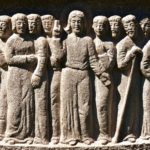
Inside the church
Encouraging fellow believers in the Word. One of my brothers here in China struggled with loneliness. His stance for Christ left him abandoned by his family and his social circle. Instead of just giving him a quick encouraging word, I made time to go eat with him on a weekly basis. Besides having many discussions at the table over the teachings of our Lord, we would also spend some time studying God’s word back at my home.Confronting those who are not living in accordance w...
Read More








